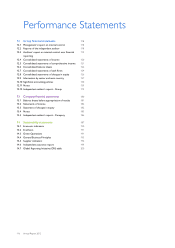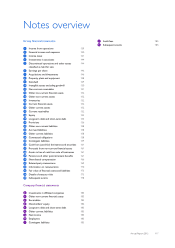Philips 2012 Annual Report Download - page 112
Download and view the complete annual report
Please find page 112 of the 2012 Philips annual report below. You can navigate through the pages in the report by either clicking on the pages listed below, or by using the keyword search tool below to find specific information within the annual report.11 Corporate governance 11.2 - 11.3
112 Annual Report 2012
year(s). The Supervisory Board aims to have appropriate experience
available within the Remuneration Committee. No more than one
member of the Remuneration Committee shall be an executive board
member of another Dutch listed company.
In performing its duties and responsibilities the Remuneration
Committee is assisted by an in-house remuneration expert acting on
the basis of a protocol ensuring that the expert acts on the instructions
of the Remuneration Committee and on an independent basis in which
conflicts of interests are avoided.
The Audit Committee
The Audit Committee meets at least four times a year, before the
publication of the annual, semi-annual and quarterly results. All of the
members of the Audit Committee are considered to be independent
under the applicable US Securities and Exchange Commission rules and
at least one of the members of the Audit Committee, which currently
consists of four members of the Supervisory Board, is a financial expert
as set out in the Dutch Corporate Governance Code and each member
is financially literate. In accordance with this code, a financial expert has
relevant knowledge and experience of financial administration and
accounting at the company in question. The Supervisory Board
considers the fact of being compliant with the Dutch Corporate
Governance Code, in combination with the knowledge and experience
available in the Audit Committee as well as the possibility to take advice
from internal and external experts and advisors, to be sufficient for the
fulfillment of the tasks and responsibilities of the Audit Committee.
None of the members of the Audit Committee is designated as an Audit
Committee financial expert as defined under the regulations of the US
Securities and Exchange Commission. The Audit Committee may not
be chaired by the Chairman of the Supervisory Board or by a (former)
member of the Board of Management.
All members of the Audit Committee are independent
The tasks and functions of the Audit Committee, as described in its
charter, which is published on the Company’s website as part of the
Rules of Procedure of the Supervisory Board, include the duties
recommended in the Dutch Corporate Governance Code. More
specifically, the Audit Committee assists the Supervisory Board in
fulfilling its oversight responsibilities for the integrity of the Company’s
financial statements, the financial reporting process, the system of
internal business controls and risk management, the internal and
external audit process, the internal and external auditor’s qualifications,
its independence and its performance, as well as the Company’s process
for monitoring compliance with laws and regulations and the General
Business Principles (GBP). It reviews the Company’s annual and interim
financial statements, including non-financial information, prior to
publication and advises the Supervisory Board on the adequacy and
appropriateness of internal control policies and internal audit programs
and their findings.
In reviewing the Company’s annual and interim statements, including
non-financial information, and advising the Supervisory Board on
internal control policies and internal audit programs, the Audit
Committee reviews matters relating to accounting policies and
compliance with accounting standards, compliance with statutory and
legal requirements and regulations, particularly in the financial domain.
Important findings and identified risks are examined thoroughly by the
Audit Committee in order to allow appropriate measures to be taken.
With regard to the internal audit, the Audit Committee, in cooperation
with the external auditor, reviews the internal audit charter, audit plan,
audit scope and its coverage in relation to the scope of the external
audit, staffing, independence and organizational structure of the internal
audit function.
With regard to the external audit, the Audit Committee reviews the
proposed audit scope, approach and fees, the independence of the
external auditor, its performance and its (re-)appointment, audit and
permitted non-audit services provided by the external auditor in
conformity with the Philips Policy on Auditor Independence, as well as
any changes to this policy. The Audit Committee also considers the
report of the external auditor and its report with respect to the annual
financial statements. According to the procedures, the Audit
Committee acts as the principal contact for the external auditor if the
auditor discovers irregularities in the content of the financial reports.
It also advises on the Supervisory Board’s statement to shareholders in
the annual accounts. The Audit Committee periodically discusses the
Company’s policy on business controls, the GBP including the
deployment thereof, overviews on tax, IT, litigation and legal
proceedings, environmental exposures, financial exposures in the area
of treasury, real estate, pensions, and the Group’s major areas of risk.
The Company’s external auditor, in general, attends all Audit
Committee meetings and the Audit Committee meets separately at
least on a quarterly basis with each of the President/CEO, the CFO,
the internal auditor and the external auditor.
11.3 General Meeting of Shareholders
Introduction
A General Meeting of Shareholders is held at least once a year to discuss
the Annual Report, including the report of the Board of Management,
the annual financial statements with explanatory notes thereto and
additional information required by law, and the Supervisory Board
report, any proposal concerning dividends or other distributions, the
appointment of members of the Board of Management and Supervisory
Board (if any), important management decisions as required by Dutch
law, and any other matters proposed by the Supervisory Board, the
Board of Management or shareholders in accordance with the
provisions of the Company’s Articles of Association. The Annual
Report, the financial statements and other regulated information such
as defined in the Dutch Act on Financial Supervision (Wet op het
Financieel Toezicht), will solely be published in English. As a separate
agenda item and in application of Dutch law, the General Meeting of
Shareholders discusses the discharge of the members of the Board of
Management and the Supervisory Board from responsibility for the
performance of their respective duties in the preceding financial year.
However, this discharge only covers matters that are known to the
Company and the General Meeting of Shareholders when the
resolution is adopted. The General Meeting of Shareholders is held in
Eindhoven, Amsterdam, Rotterdam, The Hague, Utrecht or
Haarlemmermeer (Schiphol Airport) no later than six months after the
end of the financial year.
Meetings are convened by public notice, via the Company’s website or
other electronic means of communication and by letter or by the use
of electronic means of communication, to registered shareholders at
least 42 days prior to the (Extraordinary) General Meeting of
Shareholders. Extraordinary General Meetings of Shareholders may be
convened by the Supervisory Board or the Board of Management if
deemed necessary and must be held if shareholders jointly representing
at least 10% of the outstanding share capital make a written request to
that effect to the Supervisory Board and the Board of Management,
specifying in detail the business to be dealt with. The agenda of the
General Meeting of Shareholders shall contain such business as may be
placed thereon by the Board of Management or the Supervisory Board,
and agenda items will be explained where necessary in writing. The
agenda shall list which items are for discussion and which items are
to be voted upon. Material amendments to the Articles of Association
and resolutions for the appointment of members of the Board of
Management and Supervisory Board shall be submitted separately to
the General Meeting of Shareholders, it being understood that
amendments and other proposals that are connected in the context
of a proposed (part of the) governance structure may be submitted as
one proposal. In accordance with the Articles of Association and Dutch
law, requests from shareholders for items to be included on the agenda
will generally be honored, subject to the Company’s rights to refuse to
include the requested agenda item under Dutch law, provided that such
requests are made in writing at least 60 days before a General Meeting
of Shareholders to the Board of Management and the Supervisory
Board by shareholders representing at least 1% of the Company’s
outstanding capital or, according to the official price list of Euronext
Amsterdam, representing a value of at least EUR 50 million. Written
requests may be submitted electronically and shall comply with the
procedure stipulated by the Board of Management, which procedure is
posted on the Company’s website.
Main powers of the General Meeting of Shareholders
All outstanding shares carry voting rights. The main powers of the
General Meeting of Shareholders are to appoint, suspend and dismiss
members of the Board of Management and of the Supervisory Board,
to adopt the annual accounts, declare dividends and to discharge the
Board of Management and the Supervisory Board from responsibility
for the performance of their respective duties for the previous financial
year, to appoint the external auditor as required by Dutch law, to adopt
amendments to the Articles of Association and proposals to dissolve
or liquidate the Company, to issue shares or rights to shares, to restrict
or exclude pre-emptive rights of shareholders and to repurchase or
cancel outstanding shares. Following common corporate practice in the
Netherlands, the Company each year requests limited authorization to
issue (rights to) shares, to restrict or exclude pre-emptive rights and
to repurchase shares. In compliance with Dutch law, decisions of the
Board of Management that are so far-reaching that they would greatly
























